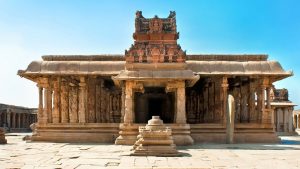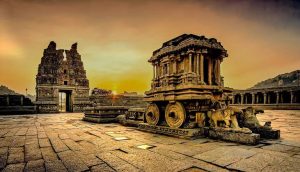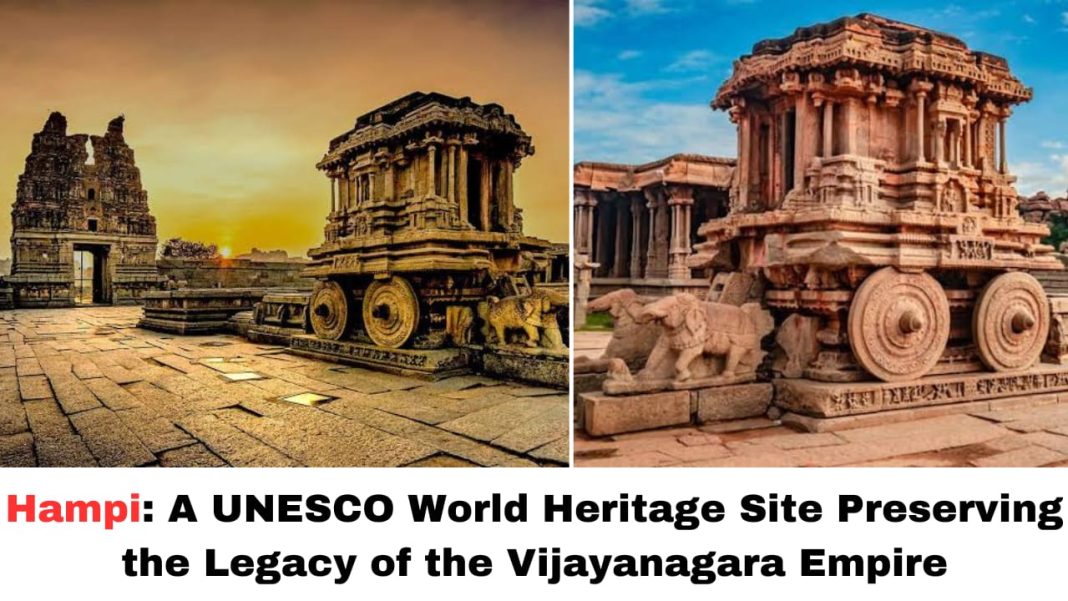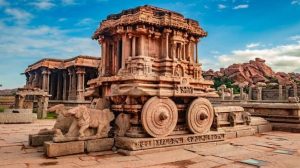Digital News Guru Education Desk:
Hampi, an ancient town located in the state of Karnataka, India, is one of the country’s most awe-inspiring historical and cultural sites. Recognized as a UNESCO World Heritage Site, Hampi is renowned for its stunning ruins, which remain a testament to the grandeur of the Vijayanagara Empire. The town was the capital of this empire from the 14th to the 16th century, flourishing as one of the largest and wealthiest cities of its time. Hampi today continues to captivate visitors with its remarkable combination of archaeological wonders, scenic beauty, and spiritual significance.
Historical Significance of Hampi
Hampi was founded in 1336 by Harihara and Bukka Raya, two brothers who were responsible for establishing the Vijayanagara Empire. Over the years, it grew into a powerful and prosperous city. At its peak, Hampi was a hub for trade, culture, and religion, boasting impressive infrastructure, grand temples, and palaces. It was home to a diverse population and a major center for the global spice trade, drawing merchants and travelers from distant lands, including the Portuguese, who marveled at the city’s wealth and architectural splendor.

The Vijayanagara Empire was a strong force in southern India for nearly 200 years, until it was defeated by a coalition of Muslim sultanates in 1565. The city of Hampi was subsequently sacked and largely destroyed. Despite this, many of the monuments remain, offering a glimpse into the region’s glorious past. The architecture of the Vijayanagara Empire is known for its intricate carvings, majestic temples, and imposing structures, which demonstrate the skill and artistry of the period’s craftsmen.
Key Attractions in Hampi
Hampi is home to more than 1,600 ancient monuments, including temples, palaces, and royal enclosures. Among the most famous landmarks are the Virupaksha Temple, the Vijaya Vittala Temple, and the Stone Chariot. Each of these sites reflects the exquisite craftsmanship and grandeur of the Vijayanagara Empire.
- Virupaksha Temple: Dedicated to Lord Shiva, this temple is one of the oldest and most important in Hampi. It continues to function as a place of worship, with pilgrims visiting it regularly. The temple complex features intricately carved pillars, halls, and a towering entrance called the ‘gopuram,’ which is characteristic of South Indian temple architecture.
- Vijaya Vittala Temple: One of the architectural gems of Hampi, this temple is famous for its remarkable Stone Chariot, which is a symbol of India’s engineering and artistic excellence. The chariot is made entirely of stone and is intricately carved, standing as a tribute to the skills of the craftsmen of the Vijayanagara period. The temple also features musical pillars that produce sounds when struck, showcasing the advanced acoustical knowledge of the era.
- Matanga Hill: For those looking to experience Hampi’s natural beauty, a visit to Matanga Hill is essential. The hill offers panoramic views of the entire area and is particularly stunning at sunrise. It’s a popular spot for travelers who want to witness the beauty of Hampi’s landscape, dotted with ancient monuments and vast boulder-strewn terrain.
- Hazara Rama Temple: This temple is known for its beautifully detailed stone carvings that depict scenes from the Hindu epic Ramayana. It served as the private temple of the Vijayanagara kings and is located within the royal complex of Hampi. The temple’s unique architectural features and the sculptural representations of the Ramayana’s stories make it an important cultural landmark.
- Lakshmi Narasimha: This statue, which stands at over 6 meters tall, is one of the largest monolithic sculptures in India. It depicts Lord Narasimha, the half-man, half-lion incarnation of Lord Vishnu. The statue is an impressive example of Vijayanagara artistry and is located near the entrance of the town.
- Hampi Bazaar and the Virupaksha Temple Complex: Hampi Bazaar is a lively and vibrant market that stretches from the Virupaksha Temple. It offers visitors a chance to immerse themselves in the local culture, buy souvenirs, and explore the bustling streets filled with food vendors, artisans, and traders. The market area is also home to several historic structures that reflect the once-thriving economy of the empire.
Natural Beauty and Outdoor Activities
Apart from its historical and religious significance, Hampi is also a haven for nature lovers. The region is located on the banks of the Tungabhadra River, and the landscape is defined by boulders, hills, and lush vegetation. Exploring Hampi’s surroundings offers visitors a chance to witness both its natural beauty and its historical significance.
- Tungabhadra River: The river is an essential part of Hampi’s geography, and a coracle ride across the river to visit nearby villages such as Anegundi is a popular activity for tourists. The river offers picturesque views of the ruins and the surrounding landscapes.
- Rock Climbing and Cycling: Hampi’s rocky terrain is ideal for rock climbing enthusiasts, with many routes offering varying degrees of difficulty. For those looking for a more laid-back experience, cycling through the ruins provides a unique way to explore the vastness of the area and visit hidden gems at a relaxed pace.
Cultural Significance and Festivals
Hampi is not just a destination for history buffs but also a center of cultural festivities. The Hampi Utsav, an annual cultural festival, brings together dance, music, drama, and other performances, held against the backdrop of the magnificent ruins. This festival celebrates the heritage and cultural traditions of Hampi, providing a colorful and lively experience for both locals and tourists.
Conclusion
Hampi is a place where history, culture, and natural beauty intersect. Its awe-inspiring ruins and temples stand as reminders of the glory of the Vijayanagara Empire, while its natural landscapes offer a serene environment for exploration and reflection. Whether you’re drawn to its religious significance, architectural wonders, or stunning vistas, Hampi offers an unforgettable experience. Its status as a UNESCO World Heritage Site ensures that it remains a key destination for travelers seeking to immerse themselves in India’s rich history and vibrant culture.

You May Also Read: Honey Singh, Jazzy B Light Up AP Dhillon’s Unforgettable Delhi Show









